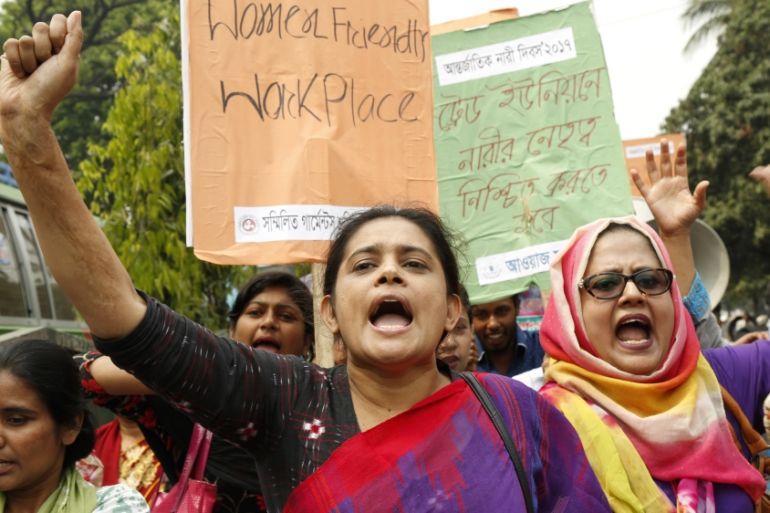Women strike for equality on International Women’s Day
A quick look at how International Women’s Day is being marked around the world.

From economic strikes to street protests, women worldwide are drawing attention to gender inequality on International Women’s Day.
|
|
Under the theme Be Bold For Change, organisers of the day are calling on individuals to take “groundbreaking action” to build a more gender-inclusive world.
UN High Commissioner for Human Rights Zeid Raad al-Hussein said the women’s movement has brought about major change, but in many countries challenges remain.
“In too many countries, we are now seeing a backlash against women’s rights, a backlash that hurts us all,” al-Hussein said in a statement .
This year, the day has taken on a political tone, with a major focus on labour.
Here’s a look at how the day is being marked around the world:
‘A Day Without Women’
Women’s day strikes, or what is being called A Day Without Women, and other actions have been planned in more than 40 countries on Wednesday.
Organisers have urged women to take a day off work or school to call attention to the economic bias faced by women.
WATCH: The effectiveness of general strikes
They acknowledged many will not be able to participate in the strike for financial or practical reasons.
“Many women in our most vulnerable communities will not have the ability to join the strike, due to economic insecurity. We strike for them,” organisers said and encouraged women who could not strike to wear something red in a show of solidarity.
![Women march in the Philippine capital, Manila, to demand equal rights. [Ted Aljibe/AFP]](/wp-content/uploads/2017/03/475616d7e0284accbc16d044edcc2157_18.jpeg?quality=80)
‘Gender equality still not a reality’ in Australia
In addition to a number of marches and events taking place across Australia, the country’s sex discrimination commissioner has issued a critical report highlighting gender inequality in the country.
|
|
Kate Jenkins warned that Australia still has a long way to go to achieve gender parity.
“While there have been substantial gains in equality under the law, one of the key findings of these consultations is that we do not have equality of outcomes,” Jenkins said.
The report, which includes interviews with more than 1,000 women, found three key areas for improvement including, economic security, leadership positions and violence against women.
Women in Africa face ‘daunting’ challenges
While African women have made significant progress in recent years, they continue to face “daunting” challenges with high rates of sexual violence, maternal mortality and HIV infections, a report , released on the eve of International Women’s Day, said.
The joint report by the United Nations and the African Union found that in every country on the continent women are denied full enjoyment of their rights.
INTERACTIVE: Women leaders around the world
Among the signs of progress mentioned was that female participation in many African legislatures is higher than in the UK and US.
Centre to protect Afghan women journalists
Reporters Without Borders (RSF) has opened Afghanistan’s first centre to protect female journalists on Wednesday.
The centre’s head, journalist Farida Nikzad, said its goal is to protect, defend and assist women in the field.
“We want to support women journalists, both in war zones and within the news organisations for which they work, to defend both their rights and their physical safety. To that end, we need the government and media owners to commit to do their part in what is a key battle for Afghan society,” Nikzad said.
Afghanistan is ranked 120th out of 180 countries in the organisation’s 2016 World Press Freedom Index .
Latin America takes on femicide
Rallies under the banner Ni Una Menos (or Not One Less) have been planned across Latin America to demand respect for women’s rights and a stronger stance against femicide in the region.
In Brazil, the main Rio de Janeiro airport will temporarily change its name to honour Maria da Penha, a prominent activist against domestic violence.
Penha was shot and electrocuted by her husband in 1983. She has since been at the forefront of the fight for justice for domestic violence victims.
A study last year found that more than 4,700 women were murdered in 2014, up 11.6 percent from a decade earlier.
![Women in Mexico remember missing or killed women by marking lamp posts with crosses. [Jose Luis Gonzalez/AFP]](/wp-content/uploads/2017/03/2612243e83194eca9ee6145cca24a0a4_18.jpeg?quality=80)
Call to celebrate men stirs controversy in Canada
On the eve of International Women’s Day, Sophie Gregoire Trudeau, the wife of the Canadian prime minister, Justin Trudeau, stirred controversy after suggesting men should be celebrated as well.
Gregoire Trudeau posted an Instagram photo with her husband and encouraged women to mark International Women’s Day by sharing a photo of their “male ally” to celebrate the “boys and men” in their lives.
While some praised Gregoire Trudeau’s post, others offered strong criticism, including Conservative MP Michelle Rempel.
Responding to the debate, Gregoire Trudeau said, “now, we are having a conversation”.